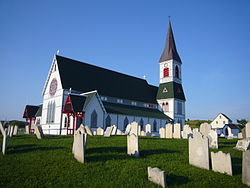Trinity, Newfoundland and Labrador
| Trinity | |
|---|---|
| Town | |

St. Paul's Anglican Church in Trinity
|
|
| Coordinates: 48°22′32″N 53°23′41″W / 48.37556°N 53.39472°W | |
| Country |
|
| Province |
|
| Settled | 18th century |
| Area | |
| • Total | 12.92 km2 (4.99 sq mi) |
| Population (2016) | |
| • Total | 169 |
| • Density | 13.1/km2 (34/sq mi) |
| Time zone | Newfoundland Time (UTC-3:30) |
| • Summer (DST) | Newfoundland Daylight (UTC-2:30) |
| Area code(s) | 709 |
Trinity is a small town located on Trinity Bay in Newfoundland and Labrador. The town contains a number of buildings recognized as Registered Heritage Structures by the province.
The harbour at Trinity was first used by fishing ships around the 16th century. The Portuguese explorer Gaspar Corte-Real named the location "Trinity" as he arrived on Trinity Sunday, 1501 although another account gives his arrival as 1500.
Fishermen from the West Country of England began using Trinity as a summer station in the migratory fishery in the 1570s. Summer fishermen continued to be primarily from the Channel Islands, especially Jersey, and Weymouth in Dorset until a permanent settlement was established. Trinity was settled by merchants from Poole, England during the 18th century, citing reasons such as the easily defensible harbor and abundance of shore space for fishing premises. Trinity was the site that Sir Richard Whitbourne held the first court of Admiralty in 1615, establishing the first court of justice in North America.
The merchant trade in Trinity was significant and dominated the social and economic life from Baie Verte to White Bay (Newfoundland and Labrador). At times, merchants in Trinity exported upwards of 30-40% of cod, train oil, and seals produced in Newfoundland. By the late 18th Century, the merchant firms in Trinity were operatoring 35 ocean-going ships, exporting 100,000 quintals of dried cod and supplying about 6,000 inhabitants.
A fort was established at Admiral's Point near Trinity in order to protect the assets of the merchants. Due to Trinity's prominence in the British-Newfoundland trade, it was attacked and twice captured by the French in the Anglo-French Wars of 1696-1713, first in 1696 and again in 1705. Both times, the properties of the residents were burnt. Trinity was again captured by the French during the Seven Years' War by Admiral de Ternay.
...
Wikipedia
